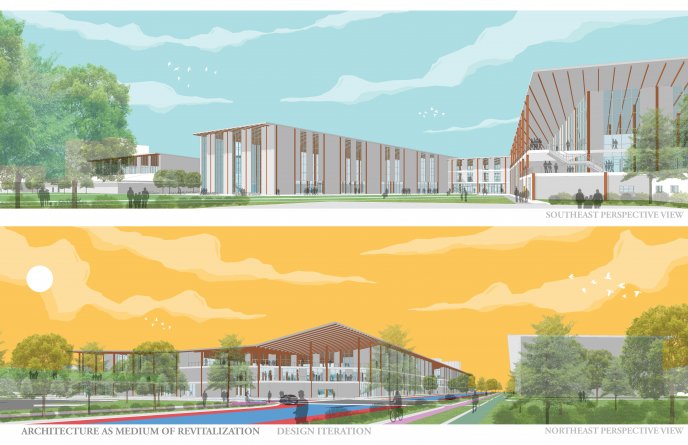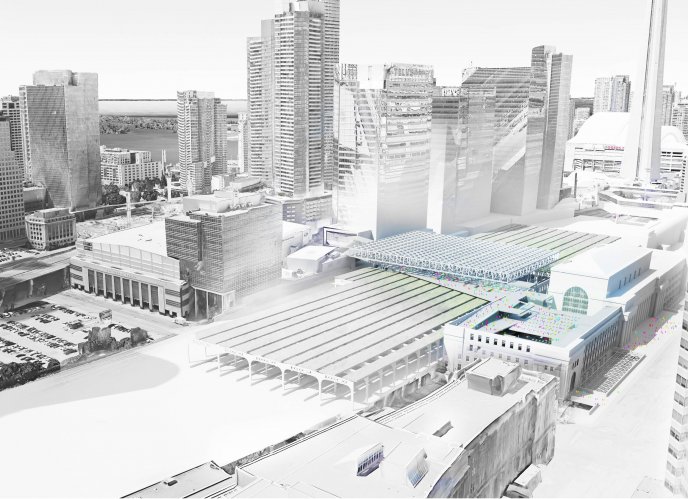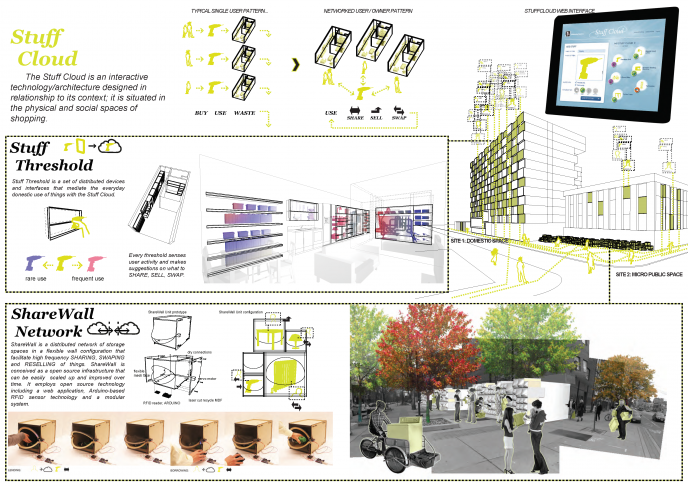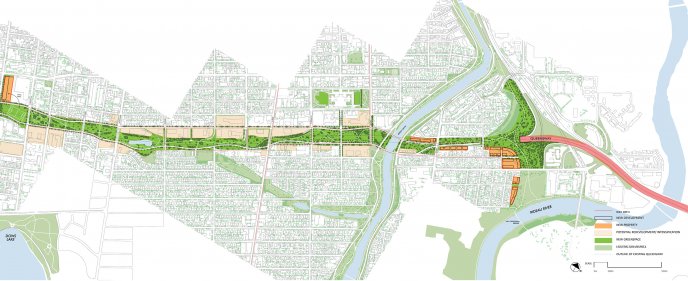Honourable Mentions
Revitalizing Suburbia: Build Integrated Communities | Connie Lei | Intern Architect

Urbanization has dragged workers to the city centre, day after day, to get to and from work for the last century. Arguably, the formation of the suburban city is modelled after the invention of cars that gave access and mobility for people to travel to the city core. Inevitably, this has led to our modern dependency on cars in the suburbs as well as segregation and inaccessibility to facilities, amenities and commercial spaces.
Minimizing the need for commuting helps protect an individual’s time, energy and mental health. The intervention of the hub suggested in this SHIFT submission addresses the long commute by introducing a new typology of workspaces, supported by the mobility of work, through locations in communities where there is a concentration of long-distance travelling. By creating a nearby hub of interconnections with less-secluded public space and a node for transit to provide access into the city, those in the community are involved in activity engaging with one another.
With the blurring of work/life balance, the goal is to integrate leisure activities and services that support daily life. The hub aims to cultivate collaboration and foster cultural identity for the modern dweller; it looks to support a healthy way of life and sustain growth in the revitalization of suburban communities.
The Counterpublic of Union Station | Aidan Mitchelmore | Intern Architect

Situated within Canada’s largest multi-modal transportation hub, and at the centre of its railway and transit infrastructure, this architectural proposal suggests an alternative future for Toronto’s Union Station.
As a foil to the predominantly retail amenities introduced by Union’s current renovation, this project proposes the addition of public programs such as a library, a resource centre, gathering spaces, a shelter for the homeless and a network of versatile public spaces. This insertion, in turn, accommodates a range of common activities including gatherings, confrontations, performances, discussions, protests and celebrations that together re-publicize and re-politicize this cultural landmark.
This proposal is situated within existing legal, financial, and architectural frameworks; it remains self-aware of the limitations put forth by the City of Toronto, the politics surrounding the current revitalization and the logistical constraints of building within an infrastructural hub. However, engaging with the work of Richard Sennett’s Spaces of Democracy and Michael Warner’s Publics and Counterpublics, this SHIFT submission looks to reveal how the confrontation of difference is fundamental to democratic exchange, and the way by which a diversity of uses within Union remains critical to its re-politicization.
The resulting design proposes a dense network of reinterpreted typologies that form a social landscape interwoven into the commercialized transit hub. Through this proposal, we may question how a revitalized infrastructure of public space may foster a more productive democratic society.
Stuff Cloud: A Smart Infrastructure for Buying, Selling, Sharing, Swapping and Remaking Things in Cities | J. Alejandro López | ALD Studio

How can the way we consume and dispose of things in cities be radically improved? The Stuff Cloud is a speculative smart infrastructure that aims to disrupt wasteful consumption patterns by increasing alternative modes of exchanging things between people in cities. The project is conceived by mixing techniques taken from architecture, interaction design and physical computing.
How does it work? The building blocks of the Stuff Cloud are the interactions between humans and their things. With a unique ID for each thing, and harnessing web-based technology, it becomes possible to simply add one’s things to the Stuff Cloud. Once your things are ‘in the cloud,’ Stuff Cloud can suggest various scenarios for use or exchange—for instance, sharing things with nearby friends or swapping things with strangers across the city. The Stuff Cloud can learn from our interactions with our things and give us insights on how to devote less mental and physical space to things we may not always want or need. This introduces new scenarios for ownership and exchange, potentially altering the way in which we exchange and dispose of things in public spaces.
As alternative modes of owning and exchanging things gain popularity, a physical infrastructure supporting these exchanges begins to take shape. This could come in the form of smart lockers, pods and large-scale pop-up shops. The cumulative result is a patchwork infrastructure that is built from the bottom-up in response to its social context and more importantly, as a result of ‘real’ versus ‘manufactured’ demand for things.
Central Parkway Study | Martin Tite, John Cook, Alex Leung and Sean Fright | GRC Architects Inc.

Central Parkway is a self-initiated urban design study project that imagines alternatives to the Queensway, which runs through, and divides, the traditional pre-war neighbourhoods of downtown Ottawa. This proposition asks what if the Queensway was developed differently, at a moment when the Province of Ontario continues to expand the Queensway. This “thought-experiment” is not a rhetorical proposal—it represents a significant body of research relating to land value, development, urban design and sustainable planning.
The study explores ways to transform the freeway and surrounding brownfield lands into a nationally significant space that beautifies Ottawa’s downtown core, and enables redevelopment and intensification bounded by 37 hectares (92 acres) of new green space in the centre of the city. The basic proposal is that the existing highway infrastructure be moved below grade (or transformed into a boulevard) in order to free up the ground for parklands, and adjacent lands for development.
_______________________________________________________________________________________
Join us at the free SHIFT 2019 Infrastructure/Architecture Challenge Presentation on May 24, 2019, at 6:30 PM at the 2019 OAA Annual Conference, which takes place in Quebec City!
For more information on the SHIFT Challenge, please visit: www.shiftchallenge.ca.